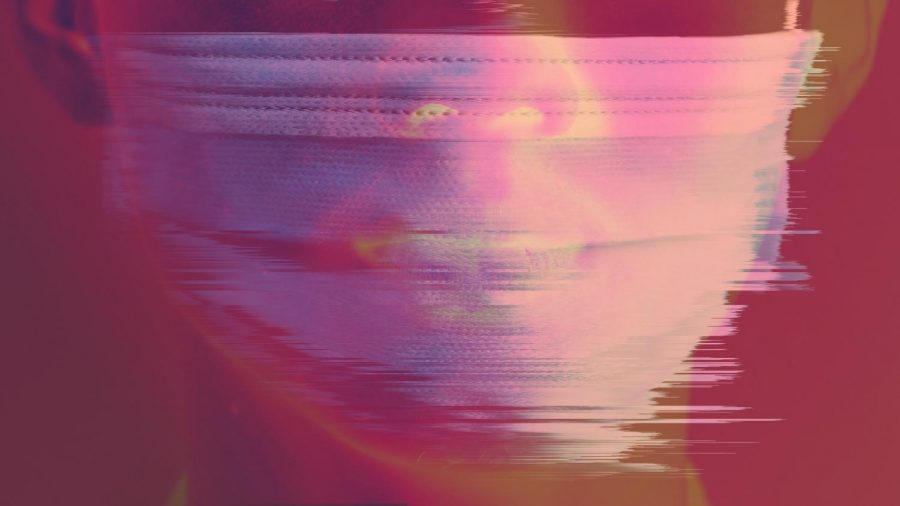Hibben: Optional Masks Don’t Encourage Vaccinations
(Design by Sydney Stam | The Daily Utah Chronicle)
June 9, 2021
The CDC recently loosened restrictions for vaccinated individuals, saying that masks are no longer a precaution they should take. With over half of the U.S. population now having received at least one dose of the COVID-19 vaccine, many states have lifted mask mandates, with some requiring masks only for those who haven’t been vaccinated.
The CDC hoped that this recommendation would encourage even more people to get vaccinated, as vaccine rates have been falling nationally and new variants are an emerging threat. However, in the states which still require masks for unvaccinated individuals, removing your mask is based on an honor code. Anyone could walk into a store without a mask and, if asked, could lie about their vaccination status. There’s even a growing market for fake vaccination cards, used by groups that refuse to get vaccinated.
Because the vaccine does not completely prevent individuals from catching the virus, the danger of changing restrictions outweighs the hope that people will be honest. The CDC has made an unsafe gamble with American lives, and the consequences for these loosened restrictions could erase the U.S.’s progress towards eradicating the coronavirus.
Although many in the U.S. have gotten or plan to get the COVID-19 vaccine, some people simply don’t want to receive it. 17% of the U.S. adult population, about 35 million individuals, say they refuse to get a vaccine. Republican men make up the largest sector of this group, reflecting the larger issue of the politicization of the COVID-19 crisis.
The anti-vaccination movement has existed for centuries, and these “anti-vaxxers” have spoken out against the COVID-19 vaccine because of its relatively short production timeline. Social media campaigns spread these messages to millions of people, sparking fear and distrust in the vaccine.
Those who are against the vaccine argue similarly to those who were anti-mask and anti-lockdown. In May 2020, heavily armed protestors gathered at the Michigan Capitol, threatening lawmakers for their decision to follow medical experts’ advice and place the state under lockdown. Former President Donald Trump and other Republican political figures supported these protestors.
Later on, three men who frequented those same protests planned to kidnap Michigan’s governor Gretchen Whitmer for her actions to place Michigan under a strict stay-at-home order. During the height of the pandemic, Republican leaders pushed false narratives and denied the severity of the crisis, which can clearly be seen in the anti-vax situation today.
If people protested and threatened violence over pieces of cloth and stay-at-home orders, there’s no reason to hope that those same individuals will truthfully follow the rules now. It’s painfully obvious that many in our nation refuse to inconvenience themselves to protect others’ health. Simply put, some people don’t want to receive a vaccine, and if lying is a gateway to removing masks, it seems unlikely that those individuals will choose to be honest.
These new suggestions triggered criticisms from public health experts, who said this move was too early and had little evidence to secure the CDC’s claim. Other incentives, experts say, like West Virginia’s prize drawing or Ohio’s new lottery system better incentivize those who are still unsure about the vaccine. Since there’s a clear reward for an action, there are no loopholes for people to lie about vaccination status, unlike these new recommendations. But, given the great difficulty in implementing and enforcing mask mandates at the beginning of the pandemic, it’s unlikely that people will get a quick shot when it’s easier to lie.
So what should we do? Medical experts say these recommendations have come too soon, so wearing a mask and continuing to social distance in public places might be our best option, even if you are vaccinated. If you aren’t vaccinated, there are many resources to help book an appointment. Vaccination is still the best protection against COVID-19 available.
While the U.S. is making significant progress towards pandemic recovery, it’s important to take the precautions that will make you feel safe. Masks and social distancing have been proven to reduce the risk of transmission, so continue to take precautions around strangers, remembering that anyone — even those who are fully vaccinated — could still spread the virus to you.
It’s impossible to trust that the person next to us at a party grabbing potato chips is being truthful when they forgo their mask. The CDC and state governments have risked our safety in hopes people will get vaccinated for the “greater good,” which is unfair and dangerous for all of us. Given the history of people’s avoidance of recommendations during the pandemic and the uncertainty of what’s to come, we simply cannot give people the benefit of the doubt.









